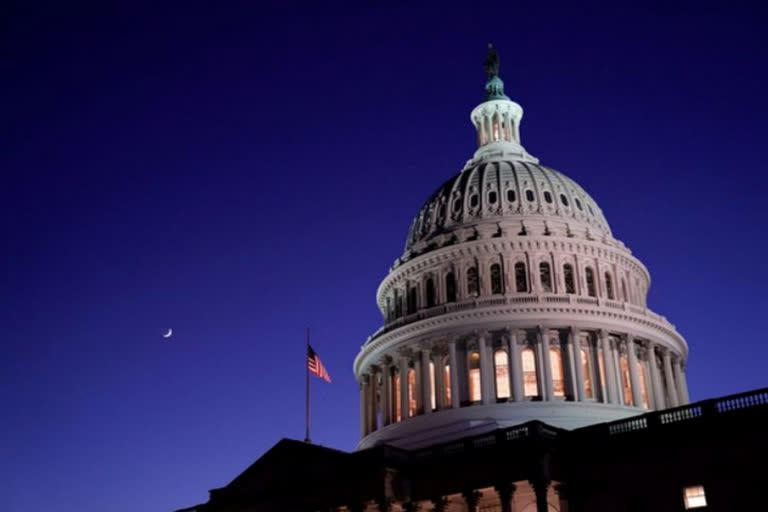Washington: A bipartisan resolution was introduced in the US Senate on Thursday to recognise Arunachal Pradesh as an integral part of India, pushing back against Beijing's military aggression to change the status quo along the Line of Actual Control. The resolution condemns additional Chinese provocations, including China's use of military force to change the status quo along the Line of Actual Control, construction of villages in contested areas, publication of maps with Mandarin-language names for cities and features in the Indian state of Arunachal Pradesh, and expansion of Beijing's territorial claims in Bhutan.
The resolution says that China claims Arunachal Pradesh as its own territory, which it calls South Tibet'', and has invoked these claims as part of its increasingly aggressive and expansionist policies. The United States recognises the state of Arunachal Pradesh not as a disputed territory but as an integral part of the Republic of India, and this recognition is not qualified in any way, says the bipartisan resolution introduced by Senator Jeff Merkley, a Democrat, and Bill Hagerty, a Republican.
Senator John Cornyn, Co-Chair of the India Caucus, has co-sponsored the resolution. Pushing back against Chinese claims that Arunachal Pradesh is its territory, which is part of Beijing's increasingly aggressive and expansionist policies, the Senate resolution reaffirms that the US recognises the McMahon Line as the international boundary between China and the Indian state of Arunachal Pradesh.
The line that was agreed to by Britain and Tibet as part of the 1914 Simla Accord is named after Sir Henry McMahon, foreign secretary of the British-run Government of India and the chief negotiator of settling disputes with China. On December 9, The Indian and Chinese troops were engaged in a fresh clash in the Yangtse area of Arunachal Pradesh's Tawang sector, in the first such major flare-up after the deadly hand-to-hand combat in the Galwan Valley in June 2020 that marked the most serious military conflict between the two sides in decades.
America's values supporting freedom and a rules-based order must be at the centre of all of our actions and relationships around the world especially as the PRC (People's Republic of China) government pushes an alternative vision, said Merkley, who serves as the Co-Chair of the Congressional-Executive Commission on China.
This resolution makes clear that the US views the Indian state of Arunachal Pradesh as part of the Republic of India not the People's Republic of China and commits the US to deepen support and assistance to the region, alongside like-minded international partners and donors, Merkley said. At a time when China continues to pose grave and gathering threats to the Free and Open Indo-Pacific, it's critical for the US to stand shoulder-to-shoulder with our strategic partners in the region especially India, said Senator Hagerty after the introduction of the resolution.
This bipartisan resolution expresses the Senate's support for unequivocally recognising the state of Arunachal Pradesh as an integral part of India, condemning China's military aggression to change the status quo along the Line of Actual Control, and further enhancing the US-India strategic partnership and the Quad in support of the Free and Open Indo-Pacific, Hagerty said.
The resolution commends India for taking steps to defend itself against aggression and security threats from China. These efforts include securing India's telecommunications infrastructure; examining its procurement processes and supply chains; implementing investment screening standards; and expanding its cooperation with Taiwan in public health and other sectors.
Among other things, the resolution serves to further strengthen the US-India bilateral partnership regarding defence, technology, economics, and people-to-people ties and promotes enhancing America's multilateral cooperation with India through the Quad, the East Asia Summit alongside its partners in the Association of Southeast Asian Nations (ASEAN), and other international fora.
Stating that Arunachal Pradesh contains the Buddhist town of Tawang, home to the revered Tawang Monastery and is the birthplace of the sixth Dalai Lama, Tsangyang Gyatso; the resolution says that China has raised diplomatic objections to visits to Arunachal Pradesh by the Dalai Lama and other leaders and has refused to grant residents of the Indian state visas for travel to China.
Provocations by China impede poverty alleviation and economic development in Arunachal Pradesh, where nearly 25 per cent of the population lives in multidimensional poverty according to India's 2021 National Multidimensional Poverty Index, leading many international donors to be cautious of providing assistance due to the state's perceived status as disputed territory, it said. (PTI)



